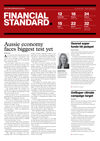Search Results | Showing 271 - 280 of 717 results for "gas" |
| | | ... The RMIT report suggests that companies should be reporting on absolute emissions using calculations based on the Greenhouse Gas (GHG) Protocol, which is a global voluntary framework "to measure and manage greenhouse gas (GHG) emissions from private ... |
| | | | ... is critical to achieving net zero commitments, and that regulatory intervention around the world brings risk to the natural gas sector. "[N]atural gas, completely combusted, still releases the equivalent of around 50-60% of the CO2 emissions that come ... |
| | | | ... accounting detail, but in fact, the ETF is the backbone supporting how countries measure, report and verify their greenhouse gas emissions ion ways that are comparable and ambitious. One expert said the ETF negotiations are integral to global stocktakes ... |
| | | | ... capital needed in the zero emissions, climate resilient transition. G20 countries accounting for 80% of global greenhouse gas emissions. Australia ranks alongside Argentina, India, Indonesia, Mexico, Russia and Saudi Arabia as among the least attractive ... |
| | | | ... (ACCUs) and their use as part of the Safeguard Mechanism. The Safeguard Mechanism requires Australia's largest greenhouse gas emitters to keep their net emissions below a baseline emissions limit that corresponds to the National Greenhouse and Energy ... |
| | | | ... fiduciary duty to produce best returns, and that there can be a trade-off to manage. Singh took the example of greenhouse gas emissions, explaining that Dimensional's research shows that there is not a pricing advantage to investing in companies ... |
| | | | Australia's major professional accounting bodies have joined international peers in a net zero greenhouse gas emissions initiative. CPA Australia and Chartered Accountants Australia and New Zealand (CA ANZ) have today joined 12 other global and national ... |
| | | | Greenhouse gas emissions and diversity top the list as areas of focus and improvement for ASX companies, according to Perennial Better Futures. The third annual Perennial Better Futures Survey takes the ESG pulse ASX-listed companies to understand where ... |
| | | | ... The MMAD system converts organic waste into energy and a fertiliser substitute. Australia is one of the largest greenhouse gas emitters in the world, wasting on average 7.3 million tonnes of food annually, which equates to around 300kg per person, according ... |
| | | | ... targets to apply to both of AGL's future demerged businesses - AGL Australia, which will hold the company's power, gas and telecommunications retailing divisions and some cleaner generation assets, and Accel Energy, which will hold carbon-heavy ... |
|

















